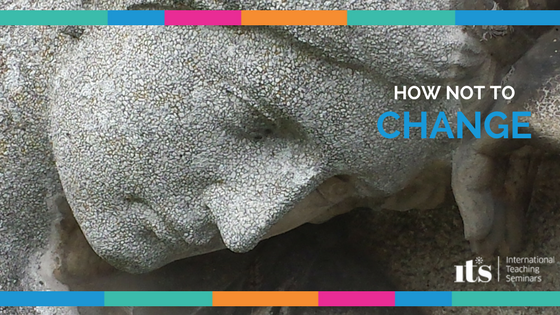Many people find change hard or scary but only some have developed a skill in staying stuck. Recognising the patterns that make this possible can be useful for everyone as it gives us more control of what we’re doing. You’ll find these patterns show up in individuals, teams and organisations so I’ve made a list of some of the tell-tale signs. I call them Recipes for Inertia.
If you want to discourage change:
- Maximise fear of the unknown
- Spend a lot of time with people who think about problems the same way
- Don’t finish anything you start
- Better still, just don’t start
- Create debilitating isolation
- Presume change is hard work
- Have unrealistic time frames for the change
- Have limiting beliefs about yourself
- Never think about new avenues
- Give up
- Believe it can’t happen
- Believe your fears
- Doubt your own competence – always
- Avoid thinking about change
- Accept you can’t do anything
- Don’t plan
- Stay distracted and don’t ever focus
- Form a committee for change and have daily meetings with compulsory attendance
- Never deviate from routines
- Keep yourself under constant pressure
- Accept ‘No’ for an answer
- Create a very large ‘Standards Manual’
- Tense up and stay that way
- Be conflicted and blame others
- Become cynical
- Above all, don’t ever dream.
Recognise any of these? One thing they all have in common is that they are driven by underlying beliefs. The question is whether these beliefs are useful to you or others. Surfacing these beliefs is often the beginning of getting back in control.
Beliefs are about reality. They are not reality itself. I find the change work I’m involved with, whether it’s with individuals, teams or organisations, often involves updating these beliefs and aligning them with current realities. Doing so gives people new choices.
Your sense of self has a history and provides continuity and meaning to your life. This is true not just of people but also organisations. If you have concerns about a proposed change compromising your identity you’re going to find yourself much more resistant. That’s why whether you’re thinking about getting married or merging with another company it’s important to be clear about how any change will actually help you be more who you really are and how this will support you in your future. We may live in an uncertain world but it’s worth being clear about the possible pay-offs of your imagined change.
The secret to changing easily is to incorporate the positive payoffs of your present behaviour into the change you are wishing to make. If you want to know more about this have a look at my earlier post Purpose of Unwanted Behaviour.
It would be smart to have a look at the beliefs that are impacting attempts to make a change. This holds true whether the challenge is personal or professional and whether it applies to an individual or an organisation. It’s often easier to this with a skilled uninvolved professional who has no axe to grind.
NLP and Coaching can be used to create rapid, powerful and effective change, and there are plenty of practical how-to skills you can learn that can change how you think and what is possible for you.
Henry Ford wasn’t making it up when he said:
“Whether you think you can, or you think you can’t – you’re right.”





Leave A Comment